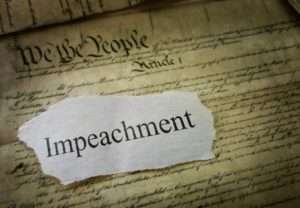The Volokh Conspiracy
Mostly law professors | Sometimes contrarian | Often libertarian | Always independent
A Simple Way for Republicans to Keep Impeachment from Exacerbating Conflict and Disunity
GOP leaders who raise this objection to impeachment can help solve the problem through the simple expedient of supporting impeachment themselves.
In recent days, some prominent Republicans have argued against impeachment on the ground that proceeding with it is likely to exacerbate national disunity and impede healing. For example, House Minority Leader Kevin McCarthy has argued that impeachment is a bad idea because "it would divide our country more." Senator Lindsey Graham has made similar statements. The Wall Street Journal editorial page also contends that impeachment should be avoided for this reason, even though they recognize that Trump committed impeachable offenses.
Republican leaders who worry that impeachment will exacerbate disunity have a simple way to address this problem: They can support impeachment themselves! For example, Kevin McCarthy could make a strong statement urging his House caucus to vote for impeachment. Graham, an influential GOP senator, could urge the same course of action on his Senate colleagues. And so on. If impeachment enjoys broad support from Republican leaders, the process could actually promote national unity rather than diminish it.
Such steps might not reconcile Donald Trump's hardcore supporters. But a good many Republicans would likely follow the lead of party leaders, and impeachment could quickly come to enjoy broad (though not universal) bipartisan support. We could also thereby achieve a broad (though, again, not universal) consensus that Trump's actions were indefensible, and deserved severe sanction, including barring him from holding federal office in the future.
Already, Trump's approval rating has fallen significantly since the attack on the Capitol, and a majority of Americans support removing him from office. GOP leaders could help broaden and deepen this agreement, and thereby help to achieve national unity and healing.
A number of prominent conservatives have already backed impeachment, including Peggy Noonan, Ed Whelan, and John Podhoretz, among others. Republican leaders concerned about unity and healing would do well to join them.
It is also worth noting that failure to impeach could itself contribute to disunity. If the GOP blocks impeachment, it would deepen justifiable suspicions that they don't really think Trump did anything seriously wrong, and oppose holding him accountable for his grave abuses of power. Many Democrats and independents would even suspect that Republicans condone Trump's actions, or at best only consider them to be minor wrongs. Sending a message like that is a poor way to promote unity.
None of this applies to people who oppose impeachment because they beleive it is unconstitutional, because they genuinely believe Trump committed no serious wrong, or some combination of both. Those types of arguments should be addressed on their own terms, and I have tried to so in other writings (e.g. here and here).
I also believe that some causes are worth the risk of exacerbating conflict and division. Imposing accountability for Trump's grave abuses of power - and deterring similar misconduct by future presidents - are among them. Unity and healing are far from the only civic values, and by no means the most important.
But political leaders who oppose impeachment because of fears of exacerbating disunity should take a long look in the mirror, and consider whether they themselves can do something to fix that issue. They might well find that the cause of the problem - and the potential solution - are staring them in the face.



Show Comments (207)